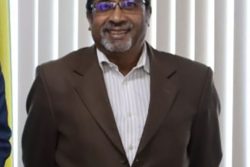Dear Editor,
The sociopolitical landscape of Guyana, marked by its colonial legacy and entrenched ethnic divisions, has long demanded voices willing to confront uncomfortable truths. Dr. David Hinds, a prominent Guyanese scholar, activist, and advocate for African Guyanese empowerment, has often employed provocative language to challenge systems of oppression and internalized subjugation. His use of the term “Lick Bottom” to describe African Guyanese complicit in the oppression of their own people has sparked controversy, but it is a critique rooted in a long tradition of radical truth-telling. To dismiss his language as divisive or disrespectful is to ignore the historical and systemic context that makes such critique necessary. Undoubtedly, Dr. Hinds’ terminology, while jarring, is a deliberate rhetorical strategy to awaken consciousness, dismantle complacency, and confront the insidious nature of internalized oppression.
Guyana’s history is steeped in colonialism, slavery, and indentureship, systems that pitted ethnic groups against one another to maintain imperial control. The British “divide and rule” policy left a legacy of tension between African and Indo-Guyanese communities, which post-independence governments have often exploited for political gain. Within this framework, some African Guyanese individuals—particularly those in positions of political or economic influence—have historically aligned themselves with power structures that perpetuate racial inequity. This complicity, whether motivated by survival, opportunism, or internalized inferiority, reinforces systemic oppression. Dr. Hinds’ use of “Lick Bottom” (a Creolized phrase akin to “bootlicking”) is not a blanket condemnation of African Guyanese people but a targeted critique of those who actively or passively uphold systems that harm their own community.
Throughout history, movements for justice have relied on bold, unflinching language to disrupt apathy and galvanize action. Frantz Fanon, in The Wretched of the Earth, dissected the psychological violence of colonialism and the complicity of “native elites” who mimic oppressors. Similarly, Malcolm X’s indictment of “House Negroes” who prioritized proximity to white power over Black liberation was intentionally provocative. Dr. Hinds’ “Lick Bottom” operates within this tradition—it is a linguistic weapon meant to shock the conscience and force introspection. By using culturally resonant Creole phrasing, he connects with the lived experiences of ordinary Guyanese while rejecting the sanitized discourse that often obscures accountability.
Critics may argue that such language is counterproductive or “un-African,” but this misunderstands the purpose of radical critique. The term is not an insult hurled indiscriminately; it is a diagnostic tool to identify behaviours that sustain inequality. When African Guyanese politicians, for example, legitimize policies that marginalize their own communities, or when elites prioritize personal gain over collective uplift, they become enablers of oppression. Naming this betrayal is not divisive—it is a necessary step toward unity.
Some may interpret Dr. Hinds’ words as dismissive of the complex realities faced by marginalized people navigating oppressive systems. Survival, after all, often requires compromise. However, his critique is not aimed at those struggling to make ends meet but at those who wield power and consciously choose to perpetuate inequity. The “Lick Bottom” label applies to actors who, in exchange for status or privilege, legitimize policies that deny housing, education, or justice to African Guyanese. It is a condemnation of the elite who weaponize racial loyalty to shield corrupt leaders or silence dissent.
To conflate survival with complicity is to strip the term of its specificity. Dr. Hinds’ rhetoric does not blame the oppressed for their oppression but challenges those who exploit their cultural capital to deepen it.
Respectability politics—the idea that marginalized groups must conform to dominant norms to earn dignity—has long stifled liberation movements. Dr. Hinds rejects this approach, recognizing that politeness rarely dismantles tyranny. By using “Lick Bottom,” he refuses to soften his message for the comfort of the powerful. This mirrors the Caribbean intellectual tradition of scholars like Walter Rodney and CLR James, who linked academic rigor to grassroots mobilization.
Finally, I do not seek to endorse ad hominem attacks but to contextualize the rhetorical strategies of a scholar-activist operating within a long tradition of anti-oppressive resistance. The struggle for justice demands both truth and courage, and Dr. Hinds’ voice exemplifies both.
Yours faithfully,
Lelon A. Saul
Lt Col (Retired)








